
Sgt. Pepper's Lonely Hearts Club Band is the eighth studio album by the English rock band the Beatles. Released on 26 May 1967, Sgt. Pepper is regarded by musicologists as an early concept album that advanced the roles of sound composition, extended form, psychedelic imagery, record sleeves, and the producer in popular music. The album had an immediate cross-generational impact and was associated with numerous touchstones of the era's youth culture, such as fashion, drugs, mysticism, and a sense of optimism and empowerment. Critics lauded the album for its innovations in songwriting, production and graphic design, for bridging a cultural divide between popular music and high art, and for reflecting the interests of contemporary youth and the counterculture.

The most distinctive music of Uruguay is to be found in the tango and candombe; both genres have been recognized by UNESCO as an Intangible Cultural Heritage of Humanity. Uruguayan music includes a number of local musical forms such as murga, a form of musical theatre, and milonga, a folk guitar and song form deriving from Spanish and italian traditions and related to similar forms found in many American countries.
Uruguayan rock first emerged in Uruguay in the 1950s. The real breakthrough for rock in Uruguay, however, as in much of the world, came with the arrival of The Beatles in the early 1960s. Although the country has a small population and is far-removed from the world's cultural centres, rock music from these land, which has always taken on an identity forged from a mix of different cultures and local peculiarities, crossing different genres and styles, has largely been a well-kept secret outside the region. Thanks to the Internet and easy access to music libraries through streaming services such as Spotify, this is now changing.

Rock en español is a term used to refer to any kind of rock music featuring Spanish vocals. Compared to English-speaking bands, very few acts reached worldwide success or between Spanish-speaking countries due to a lack of promotion. Despite rock en español's origins in the late 1950s, many rock acts achieved at best nationwide fame until the Internet consolidated the listeners. However, some rock en español artists did become internationally popular with the help of a promotional campaign from the mid-1980s to the mid-1990s called "Rock en tu idioma". Some specific rock-based styles influenced by folkloric rhythms have also developed in these regions. Some of the more prominent styles are Latin rock ; Latin alternative, an alternative rock scene that blended a Latin sound with other genres like Caribbean ska, reggae, and soca; or Andalusian rock, a flamenco-influenced style that emerged in Spain.

Los Tetas is a Chilean funk band formed in 1994 by four musicians: Pepino (drums), Rulo (bass), C-Funk and Tea Time.

Omar Ruben Rada Silva is a Uruguayan percussionist, composer, singer and television personality.
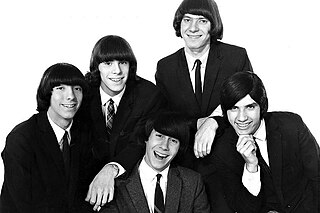
Los Mockers were a popular 1960s rock band in Latin America that was part of the Uruguayan Invasion. They were heavily influenced by The Rolling Stones and covered many of their songs. The band was formed in 1963 in Montevideo, Uruguay but moved to Argentina in 1966 after winning a contract with EMI Argentina. The original lineup disbanded in 1967. They briefly re-united in 2006.
The Uruguayan Invasion was a musical phenomenon of the 1960s similar to the British Invasion, with rock bands from Uruguay gaining popularity in Argentina.
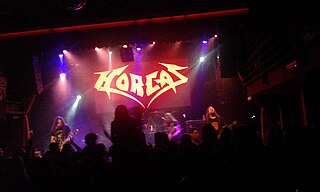
Horcas is a heavy metal band from Argentina created in 1988 by Osvaldo Civile, former guitarist for V8, Argentina’s landmark heavy metal outfit of the 1980s. After quitting V8 in 1985, and impressed by the new generation of thrash metal bands from the Bay Area led by Metallica, Civile set out to put together a new group in that style. That project, which included former V8 bandmate Gustavo Rowek on the drums, was however delayed for a number of reasons, and it was not until 1988 that it could definitely take off. By that time though, put off by the incessant postponements, Rowek had joined another former V8 member, Walter Giardino, in his new project Rata Blanca.
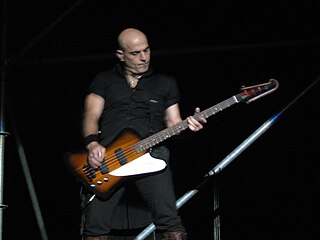
Héctor Juan Pedro Bosio better known by his stage name Zeta Bosio, is an Argentine rock musician, record producer and disc jockey (DJ), better known as the bassist of the Argentine rock band Soda Stereo. He was also the bassist of Chilean band La Ley between 2013 and 2014. Nowadays he plays in the band Shoot the Radio, which he co-founded.

Héctor Walter Giardino is an Argentine guitarist and the leader of the heavy metal and hard rock band Rata Blanca.

Mariana Ingold is a composer, instrumentalist, singer and teacher belonging to the movement of Uruguayan music, Mariana has been active as an artist since 1977 in Uruguay and internationally.
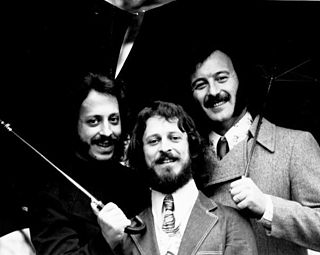
Opa were an American jazz fusion band made up of Uruguayan members. They started in the 1970s, and released two albums in the US: Goldenwings and Magic Time. Both were produced by Brazilian musician and composer Airto Moreira.
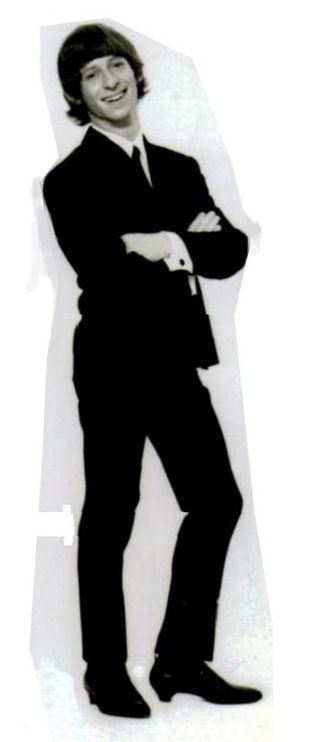
Hugo Fattoruso is a composer, arranger, multi-instrumentalist and vocalist. As well as developing a career as a soloist, he has participated and performed in many different genres: Trio Fattoruso, Hot Blowers, Los Shakers, Opa, Eduardo Mateo, etc. He has collaborated also with such renowned artists as : Airto Moreira, Abraham Laboriel, Manolo Badrena, Chico Buarque, Milton Nascimento, Ruben Rada, Djavan, etc.
Osvaldo Fattoruso was a Uruguayan musician.

Los Shakers is the first studio album by Uruguayan rock band Los Shakers. It was released in July 1965 on the Odeon Pops label.

Break It All is the only US-released studio album by Uruguayan rock band Los Shakers. It was released in January 1966 on the Audio Fidelity label.
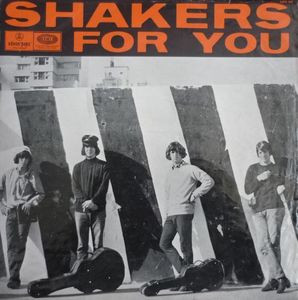
Shakers For You is the second studio album by Uruguayan rock band Los Shakers. It was released in October 1966 on the Odeon Pops label.
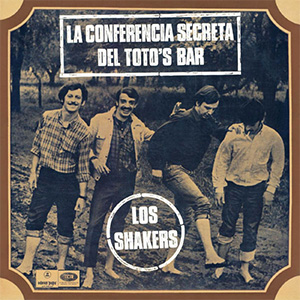
La conferencia secreta del Toto's Bar is the third studio album by Uruguayan rock band Los Shakers. It was released in December 1968 on the Odeon Pops label. It has been called the Sgt. Pepper's Lonely Hearts Club Band of Latin America.

Rostros Ocultos is a Mexican rock-pop band founded in 1985, who were moderately well known in the 80s. It was part of the post-movement started by Caifanes, and it was one of the bands that followed its principles, along with Santa Sabina, Neón, Fobia, El Tri, Kerigma and Maná, among others.

















